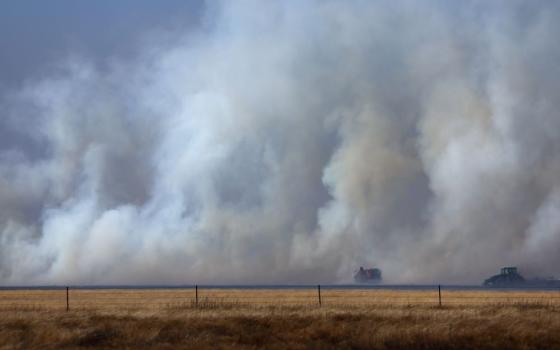Editor's note: This meditation is the first of a five-part summer series on the peace writings in the psalms.
Psalm 33 is a hymn of praise to the God of peace and a warning to those who place their hope and trust in the false gods of war. You can't serve both the God of peace and the weapons of war, it announces. It's one or the other. Show reverence to the God of peace and live in peace, gratitude and joy, or show reverence to the weapons of war and their false security and die. That's the message I get from the text. It's more radical -- and helpful -- than any spiritual writing you'll find today.
No, you say, this is just pious Bible talk. A king, an emperor, a president -- yes, even Barack Obama as well as George W. Bush and Mitt Romney -- are saved by a mighty army, by bombs, by drones, by Trident submarines, by nuclear weapons. That is the logic of every nation, every military, every war. The God of peace cannot save us. Only our weapons and warriors can save us. This is what we have been taught, what we hear preached, why we wave the flag, why we pay taxes to the Pentagon, why we risk radioactive waste, why we threaten to destroy the planet, why we spend nearly all our money on warfare instead of on schools, health care, affordable housing, food for the hungry and environmental cleanup. This is what most of us believe. Might makes right. Violence saves us. War is the will of God.
Not too long ago, one U.S. archbishop said these exact words to me: God cannot save us. Only nuclear weapons can protect us. They are our only hope.
Trust in the weapons of war, and the U.S. military has now reached unimaginable heights. According to the 2012-2013 budget, U.S. military spending will exceed the military spending of all other countries in the world -- combined. More than half of this year's budget (54 percent) goes to the Department of Defense (that is, the Department of War) -- $686 billion. China's budget spends $114 billion for war; France, $61 billion; the United Kingdom, $57 billion; Russia, $53 billion; and Canada, $20 billion. Iran pays $8 billion; North Korea, $7 billion; Pakistan, $5 billion; Venezuela, $3 billion; and Syria, $2 billion.
Meanwhile, U.S. taxpayers will pay $121 billion alone for our ongoing warfare in Afghanistan and Iraq. That specific amount could have provided 1.8 million U.S. elementary school teachers for one year; 15.5 million people with low-income health care for one year; or 15.4 million one-year scholarships for university students. Instead, we trust in the weapons of war, and our economy is crashing, our schools are crumbling, millions have no health care, billions suffer in extreme poverty around the world -- and we keep building and maintaining weapons that cannot protect us from terrorist attack.
Since 2001, we have spent $1.4 trillion for war in Iraq and Afghanistan. That same amount of money would have provided universal health care for all Americans for those same 10 years. What has this war brought us? More than 6,400 U.S. service members killed in Iraq and Afghanistan. More than 300,000 with traumatic brain injuries and PTSD. Civilian deaths estimated in the hundreds of thousands. And still, the U.S. ranks 25th in the world in infant mortality, 37th in the world in overall health care, 17th in the world in terms of life expectancy, the highest rate of childhood poverty in the industrialized world, and so forth. (For more information about these statistics and to order cards with them, go to mapm.org.)
Psalm 33 presents a stark challenge. Reliance on war, funding for war and waging war are futile. If you place your hope in war, then know that you are not placing your hope in the God of peace. If you trust in weapons and warfare for your security, know that you are not trusting in the God of peace and you are doomed to failure and death.
This truth is presented as if it is a law of nature, like a law of gravity. Jesus picks up on the message when he says: If you live by the sword, the weapon, the bomb, you will die by the sword, the weapon, the bomb. Therefore, do not live by the sword, the weapon or the bomb. Live by the way of peace, he says, and you will live. This is the first requirement of the spiritual life, the politics of the spiritual life: Renounce warfare and take up the way of peace.
Can we build our lives upon this sacred text? Could we fashion a culture -- dare I say, a Judeo/Christian society -- after these words? If we did, then we would be blessed with a new spirit of peace in our hearts and lives.
The nonviolent Jesus must have studied and prayed through this text because it provides the basic foundation for his Sermon on the Mount. If we likewise pray over and ponder these words, then we would become Sermon on the Mount people who seek to end war, create justice, make peace, offer universal love and welcome God's reign of nonviolence on earth.
Psalm 33 calls us to turn back to the God of peace who sees the violence we commit and to live in God's peace, with gratitude, joy and praise. But the specific word it uses is reverence.
Twice, Psalm 33 invites us to become people of reverence. That was one of Albert Schweitzer's favorite words. Webster's defines reverence as "a feeling or attitude of deep respect, love and awe for something sacred; veneration. Or a manifestation of this respect, love and awe." As people of reverence, we maintain an attitude of deep respect, love and awe for the God of peace. We venerate the God of peace. We manifest our respect, love and awe for the God of peace in the way we live. That means we are focused on the God of peace. We bow toward the God of peace. We live in, and through, and for the God of peace. We defer to the God of peace. We seek the God of peace. We breathe in the God of peace, and speak and heed the words of the God of peace.
"The eyes of the God of peace are upon the reverent," we are told, "upon those who hope for God's gracious help."
In this spirit of reverence, we take time each day for silent adoration of the God of peace. Then we go through our day with one eye -- our third eye, the Buddhists would say -- on the God of peace. As we keep our eye on the God of peace, the God of peace keeps both eyes on us. What a blessing!
People of reverence are people of mindfulness, peace, nonviolence, love and compassion. Living in reverence leads to equanimity because we are rooted in our attitude of respect, love and awe for the God of peace. This is a good way to live. We need not support the culture of war or be tossed about the media's glorification of violence, war or stupid politics, or our own day-to-day worries and anxieties. We remain centered, mindful, conscious and alert.
I think many of us want to be people of reverence, but we also want at the same time to maintain our American culture, its weapons, its wars, its armies and the Pentagon. Psalm 33 insists that we cannot have it both ways. Reject the culture of war, it commands. Learn new ways to resolve conflict nonviolently and return to the God of peace. Then you will be able to reclaim your soul and discover a deep foundation for peace, joy and gratitude as you wait on the God of peace. That's the conclusion:
For in the God of peace our hearts rejoice.
In your holy name we trust.
May your kindness, God of peace, be upon us.
We have put our hope in you.
This is a pledge and a prayer. Instead of trusting in America, its military, its drones and its nuclear weapons, we pledge to wait on the God of peace and trust in this peacemaking God to help us and protect us. As we do, we will be given a quiet, inner joy.
And so we pray: May your kindness be upon us. That could be a new mantra for us. It invites us to imagine the kindness of God -- and then to feel it upon us, within us and around us. Maybe then we will become kinder people and practice the politics of kindness.
Psalm 33 suggests that if we turn away from the culture of war, renounce our reliance on weapons and practice a new reverence for the God of peace, one another and all creation, then the kindness of the God of peace will rest upon us all. That, dear friends, is the best goal worth pursuing.
***
John Dear will speak Aug. 22 at the spirituality festival in Edinburgh, Scotland, and Aug. 26 near London at the annual Greenbelt Festival. His new book, Lazarus, Come Forth!, explores Jesus as the God of life calling humanity (in the symbol of the dead Lazarus) out of the tombs of the culture of war and death. To see John's 2012 speaking schedule, go to John Dear's website. John's talk at last year's Sabeel conference in Bethlehem is featured in the new book Challenging Empire. John is profiled with Dan Berrigan and Roy Bourgeois in a new book, Divine Rebels by Deena Guzder (Lawrence Hill Books). This book and other recent books, including Daniel Berrigan: Essential Writings; Put Down Your Sword and A Persistent Peace, are available from Amazon.com.
| We can send you an e-mail alert every time an On the Road to Peace column is posted to NCRonline.org. Go to this page and follow directions: E-mail alert sign-up. If you already receive e-mail alerts from us, click on the "update my profile" button to add On the Road to Peace to your list. |




